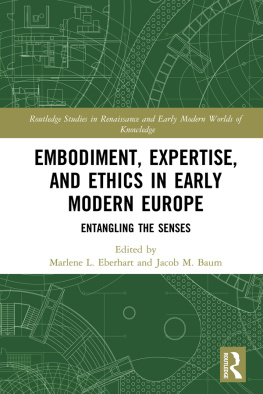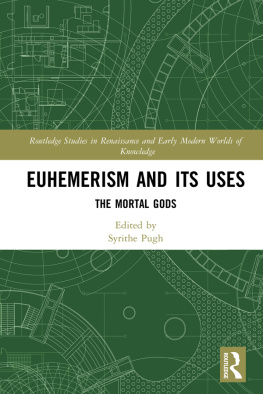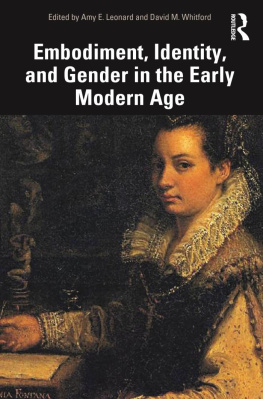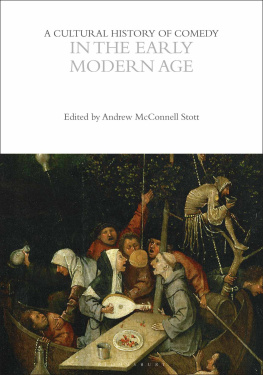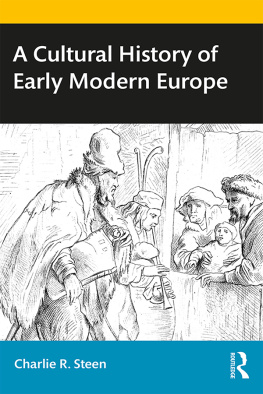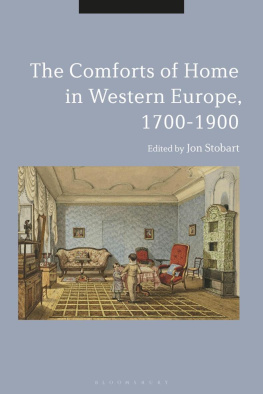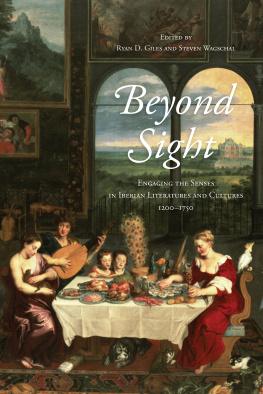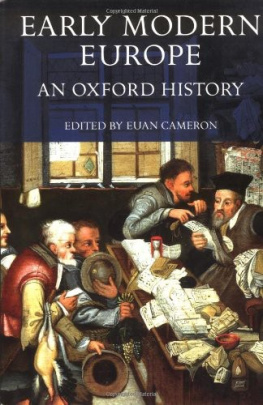Embodiment, Expertise, and Ethics in Early Modern Europe
Embodiment, Expertise, and Ethics in Early Modern Europe highlights the agency and intentionality of individuals and groups in the making of sensory knowledge from approximately 1500 to 1700. Focused case studies show how artisans, poets, writers, and theologians responded creatively to their environments, filtering the cultural resources at their disposal through the lenses of their own more immediate experiences and concerns. The result was not a single, unified sensory culture but rather an entangling of micro-cultural dynamics playing out across an archipelago of contexts that dotted the early modern European worldone that saw profound transitions in ways people used sensory knowledge to claim ethical, intellectual, and practical authority.
Marlene L. Eberhart is Professor of Music at Vanier College, where she teaches music history and aural skills. She is the author of several articles on aural-visual-tactile intersections in art, literature, and public space, and is co-editor, with Paul Yachnin, of Forms of Association: Making Publics in Early Modern Europe (2015).
Jacob M. Baum is Associate Professor of History at Texas Tech University, where he researches and teaches later medieval and early modern European history. His first monograph, Reformation of the Senses, was published in 2019. His current research focuses on the history of deafness and disability in early modern Germany.
Routledge Studies in Renaissance and Early Modern Worlds of Knowledge
Series Editors:
Harald E. Braun (University of Liverpool, UK) and Emily Michelson (University of St Andrews, UK)
SRS Board Members:
Erik DeBom (KU Leuven, Belgium), Mordechai Feingold (California Institute of Technology, USA), Andrew Hadfield (Sussex), Peter Mack (University of Warwick, UK), Jennifer Richards (University of Newcastle, UK), Stefania Tutino (UCLA, USA), Richard Wistreich (Royal College of Music, UK)
This series explores Renaissance and Early Modern Worlds of Knowledge (c.1400c.1700) in Europe, the Americas, Asia and Africa. The volumes published in this series study the individuals, communities and networks involved in making and communicating knowledge during the first age of globalization. Authors investigate the perceptions, practices and modes of behaviour which shaped Renaissance and Early Modern intellectual endeavour and examine the ways in which they reverberated in the political, cultural, social and economic sphere.
The series is interdisciplinary, comparative and global in its outlook. We welcome submissions from new as well as existing fields of Renaissance Studies, including the history of literature (including neo-Latin, European and non-European languages), science and medicine, religion, architecture, environmental and economic history, the history of the book, art history, intellectual history and the history of music. We are particularly interested in proposals that straddle disciplines and are innovative in terms of approach and methodology.
The series includes monographs, shorter works and edited collections of essays. The Society for Renaissance Studies (www.rensoc.org.uk) provides an expert editorial board, mentoring, extensive editing and support for contributors to the series, ensuring high standards of peer-reviewed scholarship. We welcome proposals from early career researchers as well as more established colleagues.
Staging Favorites
Theatrical Representations of Political Favoritism in the Early Modern Courts of Spain, France, and England
Francisco Gmez Martos
Embodiment, Expertise, and Ethics in Early Modern Europe
Entangling the Senses
Edited by Marlene L. Eberhart and Jacob M. Baum
For more information about this series, please visit: www.routledge.com/Routledge-Studies-in-Renaissance-and-Early-Modern-Worlds-of-Knowledge/book-series/ASHSER4043
First published 2021
by Routledge
2 Park Square, Milton Park, Abingdon, Oxon OX14 4RN
and by Routledge
52 Vanderbilt Avenue, New York, NY 10017
Routledge is an imprint of the Taylor & Francis Group, an informa business
2021 selection and editorial matter, Marlene L. Eberhart and Jacob M. Baum; individual chapters, the contributors
The right of Marlene L. Eberhart and Jacob M. Baum to be identified as the authors of the editorial material, and of the authors for their individual chapters, has been asserted in accordance with sections 77 and 78 of the Copyright, Designs and Patents Act 1988.
All rights reserved. No part of this book may be reprinted or reproduced or utilised in any form or by any electronic, mechanical, or other means, now known or hereafter invented, including photocopying and recording, or in any information storage or retrieval system, without permission in writing from the publishers.
Trademark notice: Product or corporate names may be trademarks or registered trademarks, and are used only for identification and explanation without intent to infringe.
British Library Cataloguing-in-Publication Data
A catalogue record for this book is available from the British Library
Library of Congress Cataloging-in-Publication Data
A catalog record for this book has been requested
ISBN: 978-0-367-53284-0 (hbk)
ISBN: 978-1-003-08126-5 (ebk)
Typeset in Sabon
by Apex CoVantage, LLC
Contents
MARLENE L. EBERHART AND JACOB M. BAUM
MARLENE L. EBERHART
CORINNE NOIROT
GARY K. WAITE
JACOB M. BAUM
HOLLY DUGAN
JAN FRANS VAN DIJKHUIZEN
ANDREW KETTLER
PHILIP HAHN
CURATED BY JACOB M. BAUM AND MARLENE L. EBERHART
Guide
The editors would like to acknowledge the many people who have been involved in this project and helped bring it to completion. We have been at work on this volume for a long time. Along the way, we have all been fortunate to present our work at various association conferences and scholarly venues, and we have benefited enormously from the refinements encouraged by the ensuing remarks and conversations. We are collectively grateful. The seeds of the idea for this book were planted at two 2008 RSA sessions in Chicago, Connecting the Renaissance Senses, organized by Marlene L. Eberhart and Carla Zecher. In 2010, Marlene began to explore a potential collection with then co-editor Matthew Milner: at the time, they were both engaged as postdoctoral fellows at McGill University, part of the multidisciplinary SSHRC MCRI-funded project, Making Publics (MaPs). Jacob M. Baum joined the project in 2014 when Marlene and Matt approached him about a potential contribution. The 2016 ACLA conference seminar, Beyond Synaesthesia: Structures and Cultures of the Senses in Early Modern Europe (14001650), organized by Marlene and Stefano Gulizia, brought an opportunity for several of us to meet and begin discussing the ideas around the sensory structures of knowledge that had become central to our endeavor.
This is a collection that has been inspired in large part by happy encounters with fellow scholars at just the right time. We would like to thank all of the contributors who have stuck with this project since the beginning, including Holly Dugan, who was part of that original RSA session; Corinne Noirot, who Marlene met through an MLA session proposal in 2010, and Gary K. Waite, who got involved shortly thereafter, thanks to Matt; Jan Frans van Dijkhuizen became part of our collaboration in 2014; and Andrew Kettler and Philip Hahn, who were invited more recently and have truly enriched the project in exciting ways. Additionally, we would like to recognize the valued contributions of scholars who were part of this conversation at various junctures along the way, and who inspired useful and important facets of the core themes we have explored, including Jasmine Lellock, Richard Wistreich, Ariadna Garca-Bryce, Emanuelle Friant, Wietse DeBoer, Stefano Gulizia, Oana Khintirian, and Sha Xin Wei. Finally, we would like to thank the anonymous reader(s) who graciously urged the volumes publication.

